9 Key Questions About Theodor Herzl’s “The Jewish State,” February 14, 1896CIE+
Nine questions guide key understandings about Theodor Herzl’s “The Jewish State.”

Nine questions guide key understandings about Theodor Herzl’s “The Jewish State.”

CIE President Ken Stein addresses what is and what is not known about why Hamas attacked October 7, 2023, why Israel was caught off guard, and what happens after the war across the region.

Three years after the Israeli government began the process to overhaul the judiciary, and after two years of war delayed efforts, the drive to rein in judicial independence continues.

Updated January 5, 2026; originally posted October 2023. By Ken Stein Hamas’ Origins The 1988 Hamas Charter and remarks by its leaders and other publications express hatred of Zionism, Israel and Jews. It is thus unmistakable that Hamas…

January 2, 2026 A week of unrest in Iran does not guarantee a revolution even if 85-plus million Iranians are angry at the country’s autocratic, theological rulers. Iran is a security-clerical oligarchy where kleptocracy, cronyism…

August 10, 2025 Updated August 11, 2025, with follow-up resources. CIE and partners including including Hillels of Georgia, American Jewish Committee, the Jewish Federation of Greater Atlanta’s JTeen initiative, the Anti-Defamation League, the Jewish Community…
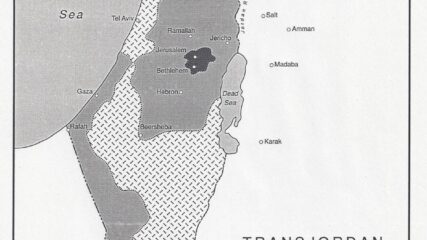
Ken Stein, President, Center for Israel Education, May 19, 2025 Introduction Since 1937, the idea of geopolitically separating Jewish and Arab populations west of the Jordan River has been a recommended solution to mitigate violence between…

Stein, Kenneth, “Legal Protection and Circumvention of Rights for Cultivators in Mandatory Palestine,” in Joel S. Migdal, (Ed.) Palestinian Society and Politics, Princeton, (1980): 233-260. In the immediate wake of communal violence that plagued Palestine…

March 12, 2025 By Ken Stein The Jewish growth in Mandatory Palestine in the period of the New Yishuv to establish a Jewish territory for a state had significantly developed by 1939. Arab leadership in…
March 5, 2025 The Center for Israel Education is unique because its work is based on Jewish context and otherwise mostly unavailable content. Providing excellence in Israel education through perspective and via multiple platforms separates…

Two major discordant issues that vexed Israel before October 7, 2023, continue to cleave Israeli society: a possible exemption from mandatory military service for the Haredim and the Netanyahu government’s persistent effort to wrench from…

Since coming to office the first time in 1996, Israel’s longest-serving prime minister, Benjamin Netanyahu, has met with four presidents (Clinton, Obama, Trump and Biden) on 11 occasions. Four times he has addressed Congress, each…

Kenneth Stein, “Palestine’s Rural Economy, 1917-1939,” Studies in Zionism, Vol. 8, No. 1 (1987), pp. 25-49. During the early decades of the 20th century in Palestine, the majority Arab population sustained itself primarily through agricultural and pastoral…
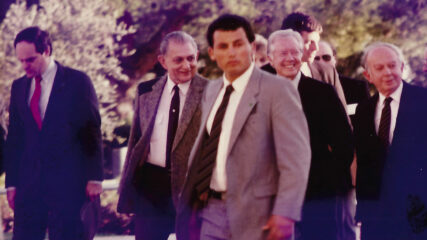
Professor Ken Stein spent decades working with and researching the presidency and post-presidency of Jimmy Carter and shared many of his insights with the media and fellow scholars after the 39th U.S. president died Dec….

January 9, 2025 By Dr. Kenneth Stein, Emeritus Professor, Emory University As the 39th president of the United States, James Earl Carter held office from 1977 to 1981. Carter was the longest-surviving former United States president…
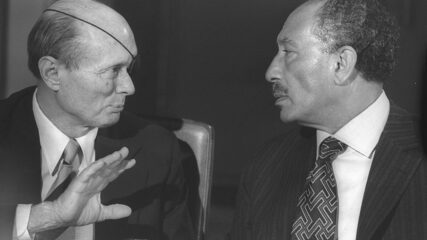
By Ken Stein, October 28, 2024 When Georgia Governor Jimmy Carter became the 39th President of the United States in 1977, he had little foreign policy experience, particularly regarding the Arab-Israeli conflict. Despite this, he…
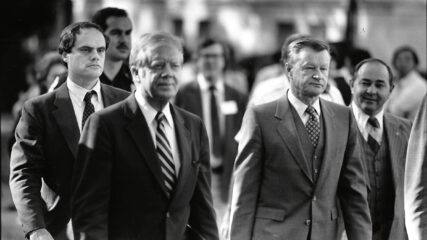
September 2024 By Kenneth Stein Kenneth Stein is Emeritus Professor of Contemporary Middle Eastern History, Political Science and Israel Studies at Emory University and President of the Atlanta-based Center for Israel Education. He is the author…
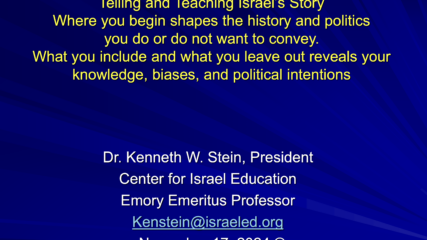
Where you choose to begin or tell or remember it shapes the history and politics you do or do not want to convey. What you include and what you leave out reveals your knowledge,
biases, and political intentions.
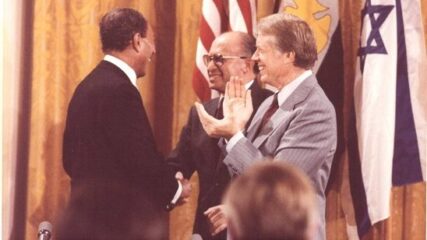
It is now apparent that distances between the Carter administration and Israel did not begin in earnest after Begin’s May 1977 election or over the settlements. Newly available materials show that from its outset, the Carter administration prioritized curbing Israeli influence in Washington.

Scott Abramson and Ken Stein, Center for Israel Education Common political, emotional and strategic threads are present in President Joe Biden’s speeches and comments about the brutal reality of the Hamas attacks on Israel and…

February 13, 2024 — Dr. Kenneth Stein and Pastor Dr. Armando Alducin, Israel y el Medio Oriente Entrevista (Israel and the Middle East) with Mauricio Friedman, (75 minutes in English and Spanish) Five points stressed in…

Since the June 1967 war, Anti-Israeli sentiment on US campuses has grown to extraordinary proportions merging with previously evolved anti-Zionism into sporadic mention to regular embrace.

Former US President Jimmy Carter embraced Hamas as a legitimate voice of the Palestinian people. His motivations possibly stretched from intentional to misguided to malevolent. Hamas leaders who were engaged in inter-Palestinian struggles remained pleased with the recognition he gave them. American officials and Israelis were keenly perturbed by the courtship he gave them.

Sung or recited on Passover, the original Dayenu is reflective appreciation of 14 significant events specifically wrapped around the exodus from Egypt. The Dayenu presented here chronicles Jewish history from Exodus to the present day. This history can be read individually or responsively. Different moments and personalities in Jewish history could have been included. Hebrew and Spanish versions of Dayenu are available.